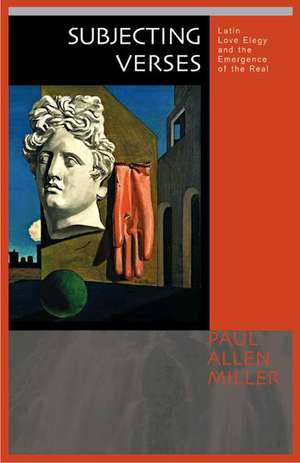Subjecting Verses – Latin Love Elegy and the Emergence of the Real
Autor Paul Allen Milleren Limba Engleză Hardback – 15 dec 2003
Paul Allen Miller harmoniously weds close readings of the poetry with insights from theoreticians as diverse as Jameson, Foucault, Lacan, and Zizek. In welcome contrast to previous, thematic studies of elegy--efforts that have become bogged down in determining whether particular themes and poets were pro- or anti-Augustan--Miller offers a new, "symptomatic" history. He asks two obvious but rarely posed questions: what historical conditions were necessary to produce elegy, and what provoked its decline? Ultimately, he argues that elegiac poetry arose from a fundamental split in the nature of subjectivity that occurred in the late first century--a split symptomatic of the historical changes taking place at the time.
Subjecting Verses is a major interpretive feat whose influence will reach across classics and literary studies. Linking the rise of elegy with changes in how Romans imagined themselves within a rapidly changing society, it offers a new model of literary theory that neither reduces the poems to a reflection of their context nor examines them in a vacuum.
Preț: 541.36 lei
Preț vechi: 703.06 lei
-23% Nou
Puncte Express: 812
Preț estimativ în valută:
103.59€ • 108.45$ • 85.71£
103.59€ • 108.45$ • 85.71£
Carte tipărită la comandă
Livrare economică 05-19 aprilie
Preluare comenzi: 021 569.72.76
Specificații
ISBN-13: 9780691096742
ISBN-10: 0691096740
Pagini: 336
Dimensiuni: 171 x 249 x 27 mm
Greutate: 0.62 kg
Ediția:New.
Editura: Princeton University Press
Locul publicării:Princeton, United States
ISBN-10: 0691096740
Pagini: 336
Dimensiuni: 171 x 249 x 27 mm
Greutate: 0.62 kg
Ediția:New.
Editura: Princeton University Press
Locul publicării:Princeton, United States
Descriere
The elegy flared into existence, commanded the cultural stage for several decades, then went extinct. This book accounts for the swift rise and sudden decline of a genre whose life span was incredibly brief relative to its impact. It presents the history of Latin erotic elegy since Georg Luck's.
